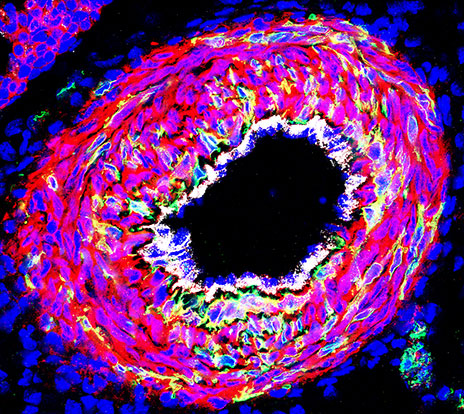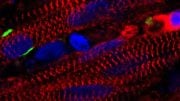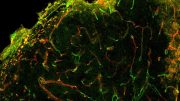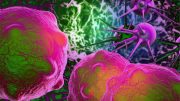
Fate mapping indicates that pre–existing smooth muscle cells contribute to the excess aortic smooth muscle in elastin mutants.
New research from Yale University investigates factors that squeeze, or narrow, the aorta in a common vascular disease, revealing a target for potential new treatments.
Individuals who suffer from supravalvular aortic stenosis, a condition characterized by narrowing of the aorta, have only one copy instead of the usual two copies of the gene encoding elastin. Elastin is critical because it allows the artery to expand and contract as blood is pumped through it. To better understand this genetic defect, the research team analyzed tissue from patients as well as mice with the mutant gene. In both cases, the researchers observed an increase in a protein known as integrin beta3. When the scientists inhibited integrin beta3 genetically or with a drug that blocks its activity, the aortic stenosis was mitigated.
“The most important findings were that when we inhibit integrin beta3 in mice lacking the elastin gene, it prevents the stenosis and increases their survival,” said senior author Daniel Greif, assistant professor of cardiology and the study’s senior author. First author Ashish Misra, a postdoctoral fellow in the Greif lab, emphasized that this increased survival is unprecedented in mice that lack elastin.
The study results promise to lead to medical therapies that would replace or at least delay major surgery or other invasive treatments, which are the only current options for patients, say the investigators.
The study was published online February 8 in the Journal of Experimental Medicine.
Reference: “Integrin β3 inhibition is a therapeutic strategy for supravalvular aortic stenosis” by Ashish Misra, Abdul Q. Sheikh, Abhishek Kumar, Jiesi Luo, Jiasheng Zhang, Robert B. Hinton, Leslie Smoot, Paige Kaplan, Zsolt Urban, Yibing Qyang, George Tellides and Daniel M. Greif, 8 February 2016, Journal of Experimental Medicine.
DOI: 10.1084/jem.20150688









Be the first to comment on "New Yale Study Pinpoints Key Protein in Severe Vascular Disease"